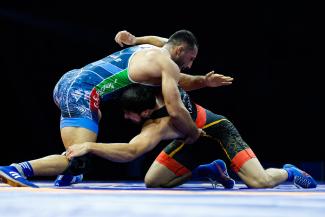Ryu Grabs Ticket to Tokyo While Kyrgyzstan Secures Three Olympic Spots
Friday, April 9, 2021 - 09:59 By Ken Marantz

ALMATY, Kazakhstan (April 9) --- Veteran Hansu RYU (KOR) earned another shot at the Olympics, while Kyrgyzstan grabbed three spots at the Tokyo Games as the Greco-Roman competition kicked off the Asian Olympic qualifying tournament on Friday.
Ryu, a 33-year-old former world champion, punched his ticket to Tokyo this summer when he advanced to the semifinals at 67kg, clinching one of the two berth available at the continental qualifier at Almaty's Baluan Sholak Palace of Culture and Sports.
Iran's bid to fill out its dance card in Greco-Roman at Tokyo came up one short when 2019 Asian champion Hossein NOURI (IRI) was dealt a heartbreaking 4-4 defeat by Fei PENG (CHN) in the 87kg semifinals.
Iran, which had already secured three Greco berths at the 2019 World Championships in Nursultan, picked up two of the three other spots with semifinal runs by Mohammadreza GERAEI (IRI) at 67kg and Mohammadhadi SARAVI (IRI) at 97kg.
China and Korea also captured two Olympic berths, while host Kazakhstan, Olympic host Japan and Uzbekistan grabbed one each.
Ryu, last year's Asian champion who placed fifth at the Rio 2016 Olympics, advanced to the final in the night session with an impressive victory by fall over Aram VARDANYAN (UZB), the 2019 world silver medalist at 72kg.
Twice Ryu scored a takedown, then used a high chest wrench to score with a roll and build an 8-0 lead. After the second combination, Vardanyan conceded allowing the fall at 1:21.
Ryu missed out on qualifying at the Nursultan worlds when he lost close decisions to eventual champion Ismael BORRERO MOLINA (CUB) and Frank STAEBLER (GER).
In the final, he will face Geraei, the 2019 world U-23 and Asian champion who advanced with a fall and two technical falls, the last a 9-1 rout of Ashu ASHU (IND) in the semifinals.
"It's great to qualify here and I am ready for the Tokyo Olympics," Geraei said. "It's always great to be a champion. My brother (Mohammadali GERAEI, 77kg) qualified for the Tokyo Olympics and he is a champion as well. He got it in Nursultan and I did it in Almaty. We will now do well in Tokyo."
Zholaman SHARSHENBEKOV (KGZ) led the Kyrgyz trio of semifinalists when the 2020 Asian silver medalist upended Gyandender GYANDENDER (IND) 6-1 in the 60kg semifinals.
He will take on 2018 world bronze medalist Sailike WALIHAN (CHN), who capped a 10-0 technical fall victory over Firuz MIRZORAJABOV (TJK) with a mighty 4-point throw.
Later, Akzhol MAKHMUDOV (KGZ) and Uzur DZHUZUPBEKOV (KGZ) joined their compatriot with semifinal victories at 77kg and 97kg, respectively. Makhmudov manhandled Singh GURPREET (IND) with a pair of 4-point bear-hug throws in an 8-2 win, while Dzhuzupbekov unleashed a 4-point throw from par terre position in a 6-0 victory over Seyeol LEE (KOR).
"It was a dream to qualify for the Olympics since childhood," Makhmudov said. "When I was old enough to understand things, I only thought about the Olympics. The semifinal was exactly how I planned to wrestle. I think it was one of my best bouts."
Makhumudov will next face Shohei YABIKU (JPN), who salvaged an otherwise tough day for the Olympic host nation by beating Hujun ZHANG (CHN), 6-2. Coming into Almaty, Japan had qualified in only one Greco weight, 60kg from world champion Kenichiro FUMITA (JPN).
Kyrgyzstan came across the border also having secured only one Olympic spot in Greco, at 87kg, at the World Championships, and will now return with four, tied with Uzbekistan.
Next up for Dzhuzupbekov will be 2020 Asian champion Saravi, who advanced with a 10-2 technical fall over Yanan CHEN (CHN).
China's Peng will be heading to his second Olympics after a stunning reversal of fortune against Nouri. Trailing 4-0 in the second period, Peng was being driven backward when he hit a last-ditch back drop that sent the Iranian to his back for 4 points and a victory by criteria.
"I didn't plan anything for the semfinal, I just wrestled normal," said Peng, a 2018 Asian bronze medalist. "I have lost to him many times in the past so it was great to win. I am excited for Tokyo."
Awaiting him in the final will be 30-year-old Nursultan TURSYNOV (KAZ), who pulled off a little late-match magic of his own -- not once, but twice. After having to rally to defeat Masato SUMI (JPN) 5-3 in the quarterfinals, Tursynov stormed back from a 3-0 deficit to defeat 2020 Asian champion Kumar SUNIL (IND), 9-5, with a big 4-point throw being the decisive move.
The most dominant performance of the day was turned in by Muminjon ABDULLAEV (UZB) at 130kg. With the weight class split into round-robin groups, Abdullaev made short work of his three group opponents, scoring a fall and two technical falls, then trounced Lingzhe MENG (CHN) by 9-0 technical fall in the semifinals. None of his four matches lasted more than two minutes.
Minseok KIM (KOR) gave Korea a second Olympic spot by defeating Naveen NAVEEN (IND), 7-1, in the other semifinal.
The competition continues with women's wrestling on Saturday and freestyle on Sunday.
Greco-Roman semifinal results:
60kg
Sailike WALIHAN (CHN) df. Firuz MIRZORAJABOV (TJK) by TF, 10-0 (4:25)
Zholaman SHARSHENBEKOV (KGZ) df. Gyandender GYANDENDER (IND), 6-1
67kg
Hansu RYU (KOR) df. Aram VARDANYAN (UZB) by Fall, 1:21 (8-0)
Mohammadreza GERAEI (IRI) df. Ashu ASHU (IND) by TF, 9-1 (2:07)
77kg
Akzhol MAKHMUDOV (KGZ) df. Singh GURPREET (IND), 8-2
Shohei YABIKU (JPN) df. Hujun ZHANG (CHN), 6-2
87kg
Nursultan TURSYNOV (KAZ) df. Kumar SUNIL (IND), 9-5
Fei PENG (CHN) df. Hossein NOURI (IRI), 4-4
97kg
Mohammadhadi SARAVI (IRI) df. Yanan CHEN (CHN) by TF, 10-2 (4:32)
Uzur DZHUZUPBEKOV (KGZ) df. Seyeol LEE (KOR), 6-0
130kg
Muminjon ABDULLAEV (UZB) df. Lingzhe MENG (CHN) by TF, 9-0 (1:53)
Minseok KIM (KOR) df. Naveen NAVEEN (IND), 7-1


Share your thoughts.
Comments